How to Draw a Easy Zebra Step by Step
Zebras are beautiful creatures with exciting and intricate patterns. These beautiful and unique patterns make zebra drawing a satisfying activity. In this tutorial, we show you how to draw a zebra step-by-step. We will guide you through the zebra drawing process, helping you nail the perspective and patterns of this wonderful grasslands animal.
Table of Content
- 1 How to Draw a Zebra Step-by-Step Tutorial
- 1.1 Step 1: Creating the Shape of the Main Body
- 1.2 Step 2: Outlining the Head Shape
- 1.3 Step 3: Creating the Muzzle of Your Zebra Drawing
- 1.4 Step 4: Outlining the Ear of Your Zebra Drawing
- 1.5 Step 5: Creating the Neck of Your Zebra Drawing
- 1.6 Step 6: Drawing the Mane of Your Zebra Art
- 1.7 Step 7: Outlining the Shape of the Front Legs
- 1.8 Step 8: Shaping the Rump and Back Legs of Your Zebra Drawing
- 1.9 Step 9: How to Draw a Zebra Easy Outline
- 1.10 Step 10: Adding Zebra Art Details
- 1.11 Step 11: Creating the Zebra Art Patterns
- 1.12 Step 12: Applying the Base Color Coat
- 1.13 Step 13: Creating Some Light Shading
- 1.14 Step 14: More Shading and Detail Coloring
- 1.15 Step 15: Adding Complimentary Highlights to Your Zebra Drawing
- 1.16 Step 16: Adding Color to the Zebra Art Pattern
- 1.17 Step 17: Creating Highlights Within the Pattern
- 1.18 Step 18: Finishing Our Zebra Drawings
- 2 Frequently Asked Questions
- 2.1 If You Have Not Drawn Zebras Before Will This Tutorial Help?
- 2.2 How to Draw a Zebra Step-by-Step?
How to Draw a Zebra Step-by-Step Tutorial
When you first approach a zebra drawing, you may feel a little overwhelmed. This is why we begin our tutorial with eight construction steps to help you lay down the shape of the zebra drawing before you begin adding details and coloring. This is just one of the ways that we make learning how to draw a zebra easy. Take a look at the collage below to see an outline of the zebra drawing tutorial.
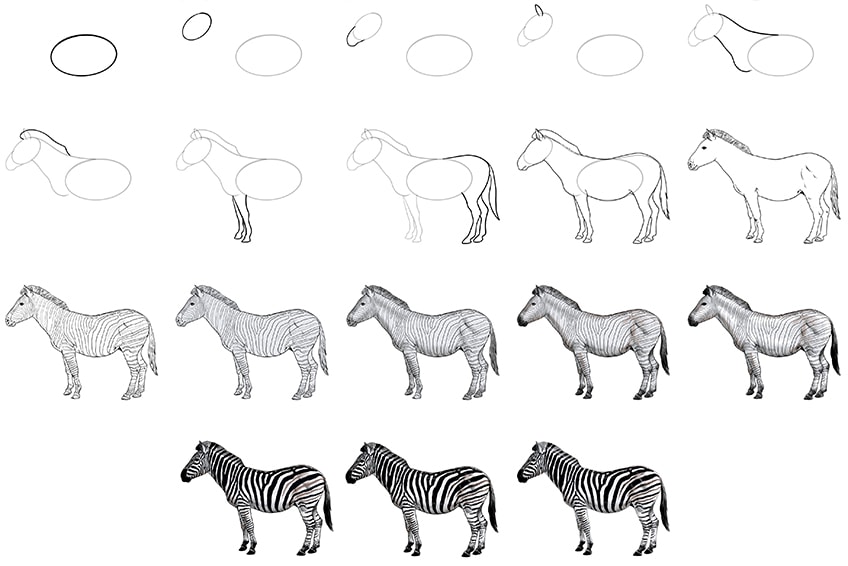
Although zebras are black and white, you will need to add color in the last few steps. The medium that you choose for these coloring steps is completely up to you. We have used a graphic tablet for our example drawings, but you can adjust the coloring steps to suit your chosen medium.
So, whether it is acrylic paint or coloring pencils, gather your drawing supplies, and let us begin our realistic zebra drawing.
Step 1: Creating the Shape of the Main Body
To begin our zebra drawings, we are going to use a construction shape to lay down the foundations for the main body of the zebra. The best shape for the main body is a large oval shape. Draw this oval laying horizontally on your canvas.
Remember to place the main body oval in the very center of your canvas leaving plenty of space on all sides for the other parts of the zebra's body.

Step 2: Outlining the Head Shape
For the head shape outline, you are going to use another oval shape. This head oval should be much smaller than the body oval and it should be tilted with the top leaning towards the back of the canvas.
Place this small tilted head oval some space away from the main body oval to the left.

Step 3: Creating the Muzzle of Your Zebra Drawing
Things start to get a little more freehand in this step. To lay down the shape of the muzzle, you are going to draw an uneven "U" shaped curve on the end of the head oval shape.
You want the bottom side of this muzzle to curve up slightly before it touches back onto the head oval.
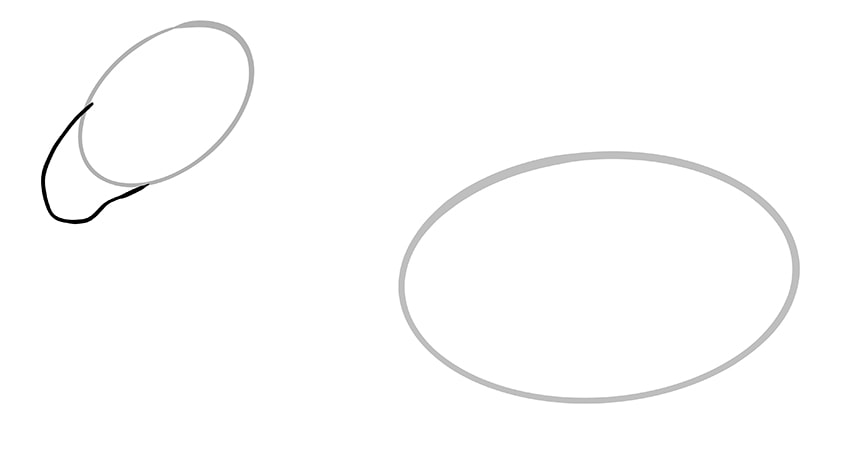
Step 4: Outlining the Ear of Your Zebra Drawing
Due to the perspective that our zebra drawings are from, only one of the ears is visible. The placement of this ear is important, as it should be placed at the highest point in the head oval.
Draw a pointy ear that begins just within the head oval.

Step 5: Creating the Neck of Your Zebra Drawing
You are now going to bring your zebra art to life a little more by drawing in the necklines. You are going to use these two lines to join the head and body of your zebra drawing. Begin with the upper neckline, creating a smooth curve from the top point of the head oval to the top of the main body oval. For the bottom neckline, you want to begin just below the midpoint of the head oval and take the line down towards the bottom of the main body oval.
Just before you reach the main body oval, create a little hump to represent the chest of our zebra drawings.

Step 6: Drawing the Mane of Your Zebra Art
Many of you will not have drawn zebras manes before, but it is not very difficult at all. As this is still a construction step, we are not drawing the mane in any detail. Instead, we are simply going to draw a rough outline of where the mane of your zebra drawing will lie.
Begin the mane line just in front of the ear construction shape, curving it forward before taking it up and back down to join the top of the neckline.

Step 7: Outlining the Shape of the Front Legs
In our zebra drawings, the zebra is standing still, so all of the legs extend straight down towards the ground. Begin with the leg that is closest to us, as this leg will be fully visible. Draw a curving leg line that begins at the bottom of the neck hump and ends on the bottom of the main body oval. Ensure that there is a sharp hoof definition at the bottom of this leg.
The second front leg is further away from our perspective and will therefore be slightly obstructed by the first leg we drew. Just in front of this first front leg, draw the front line and hoof of the second.

Step 8: Shaping the Rump and Back Legs of Your Zebra Drawing
In this step, you are going to create the shape of the zebra's rump, back legs, and tail. Begin with the rump, drawing a curved shape that begins just behind the point where the neckline joins the main body oval. This rump shape should curve out and then down around the back of the main body oval. Take this rump line down to form the back leg that is closest to us. Finish this leg by joining it to the underside of the main body oval.
Draw the second back leg protruding from the back of this first leg, and finish this step by drawing a curved tail from the back of the rump shape.

Step 9: How to Draw a Zebra Easy Outline
You may be relieved to know that the construction steps have come to an end. You are now going to use all of these construction lines to help you create the final outline of your zebra drawing. In this step, you will see how useful construction shapes can be if you have never drawn zebras before. Begin the outline at the head of your zebra, following the construction lines very closely. Add some additional line details to the ear and mouth of your zebra drawing, and then begin to outline the mane of your zebra with slightly scratchy lines.
These scratchy lines can be used to outline both the mane and the tail to create the impression of hair.
Continue to outline the body of your zebra drawing, following the curve of the belly and legs, and joining the head to the neckline. You can finish this step by drawing scratchy lines on the top of the hooves to create separation. Finally, you can erase any remaining construction lines.
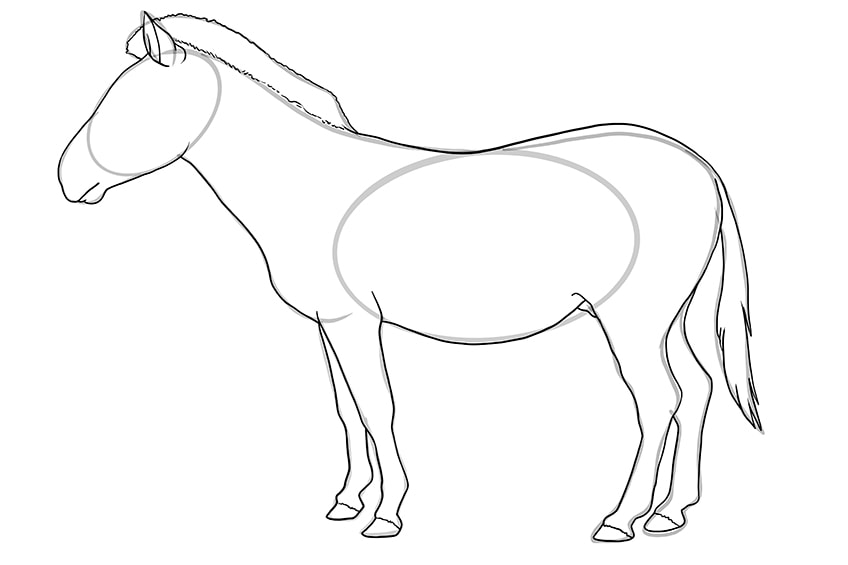
Step 10: Adding Zebra Art Details
We begin to add some detailing in this step, including the hair strokes of the mane and tail, some texture on the hooves, and some facial details. Begin at the face, drawing an almond-shaped eye in the slight bump on the face. This eye should be darker around the edges and have a small white area in the center.
Staying in the face area of your zebra drawing, add a nostril at the tip of the nose and surround this with a few textural dots.
Add some fur lines within the ear of your zebra, and continue down the neck filling out the mane with long hairs. Use freehand lines to create contour texture along the chest, thigh, and leg joint areas. You can then add some small dotted line details along the base of the hooves and finish the step by filling the tail with long fur lines.
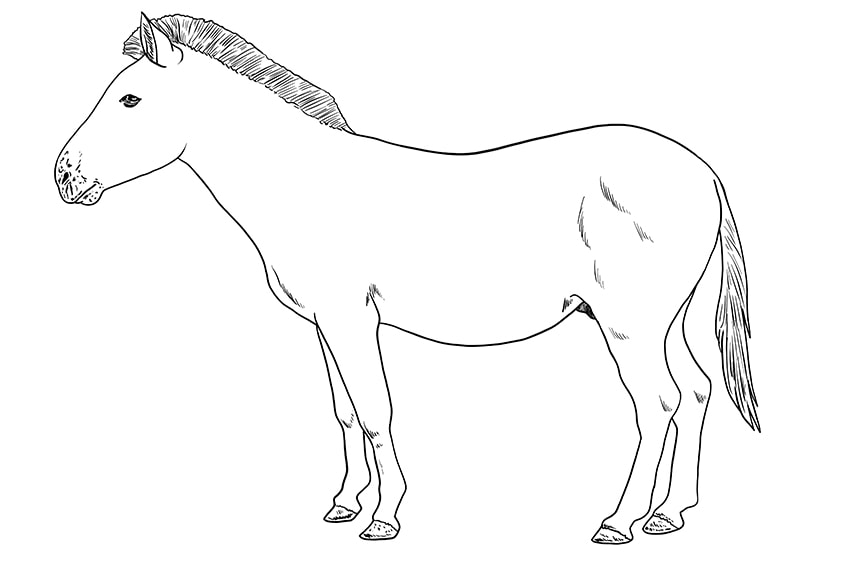
Step 11: Creating the Zebra Art Patterns
The time has finally come to give the zebra drawing its stripes. This pattern is the most notable characteristic of all zebra art, and in this step, we show you the best method for how to draw zebra easy stripes. Begin, as always, with the head, creating a stripe pattern that follows the shape of the top of the nose all the way down to just above the dotted nose texture. Try to draw one line at a time and keep the stripes at a similar width. As you move back in the face, create a curving stripe pattern around the eyes, nose, and ears.
You can now begin to move down throughout the rest of the body of your zebra drawing, filling the body with this beautiful striped pattern.
The stripes on the neck and mid-body should be fairly vertical and can begin to curve around the rump when you get there. You can make the stripes thicker as you get further away from the zebra's head. The stripes on the legs should be horizontal, and you should try to make them flow as naturally as possible from the pattern on the body.
When drawing the edges of the striped pattern on the body and legs of your zebra drawing, try to add a slight curve to give the appearance of them wrapping around the body.

Step 12: Applying the Base Color Coat
Although zebra art is typically black and white, the white is not pure. As a base coat, we are going to use a very light gray shade to fill the entire body of our zebra drawings.
Whichever medium you choose to use, make sure that this base coat is even and smooth.
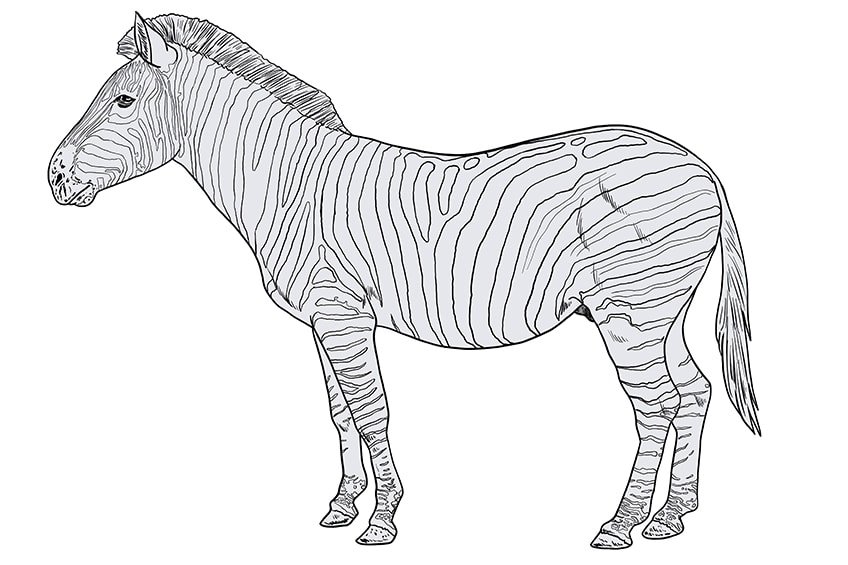
Step 13: Creating Some Light Shading
Shading is one of the primary ways that we can add depth and dimension to a drawing. For this first shading step, you want to use a touch of black paint and a very soft blending brush. Shade around the outline of the zebra drawing and along some of the detail lines including the contours, the top of the nose, and down the front of the legs.
The areas that are darkest should be the mane, the muzzle, hooves, and tail.
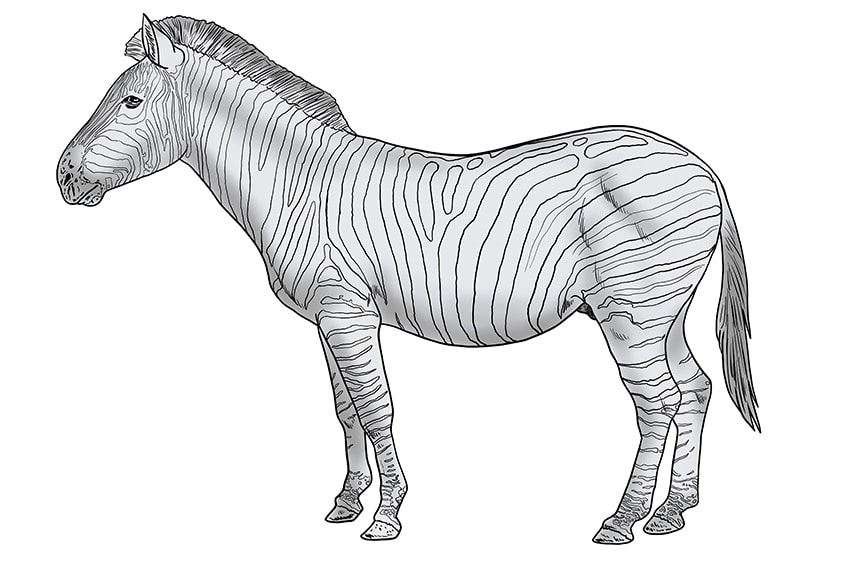
Step 14: More Shading and Detail Coloring
For this step, you can keep using the small soft blending brush and a touch of black paint to make the hooves and lower parts of the legs much darker. You can also add some more dark shading to the muzzle, the nostrils, eye, and inner ear. Darken the areas where the belly meets the top of the legs and the mane and tail.
Finish this step by using a touch of light brown paint to color over the contour lines within the body and chest.

Step 15: Adding Complimentary Highlights to Your Zebra Drawing
Now that we have worked with some black for the shading, we are going to change course and use some white to add highlights throughout the body of your zebra drawing. Use a small soft blending brush, and gently stroke upwards within the mane, blending the highlight into the shading. Finish the face highlighting by adding a touch of white to the back of the ear.
You can add a touch of highlight to the top of the rump, down the center of the face and neck, and along the side of the main body and the legs.

Step 16: Adding Color to the Zebra Art Pattern
Now that we have the base shading and highlighting complete, it is time to add color to the signature zebra stripe pattern. Use a fine sharp brush to separate the pattern from the background of the body. With black paint, paint the inner lines of the pattern, keeping a blank stripe between them. It is always best to begin at the face and work your way down the neck onto the body. You can also add stripes within the mane.
Finish this step by using a little light brown paint to paint four sharp pattern lines in between the black and white patterns on the rump.

Step 17: Creating Highlights Within the Pattern
To breathe a little more life into the pattern, take a small blending brush and some white color and add a small light highlight on each dark pattern. Try to follow the shape of the highlights from the earlier steps, and you want to create a continuous line across the patterns.
Finish the step by adding a small light area on the muzzle and nostrils of your zebra drawing.
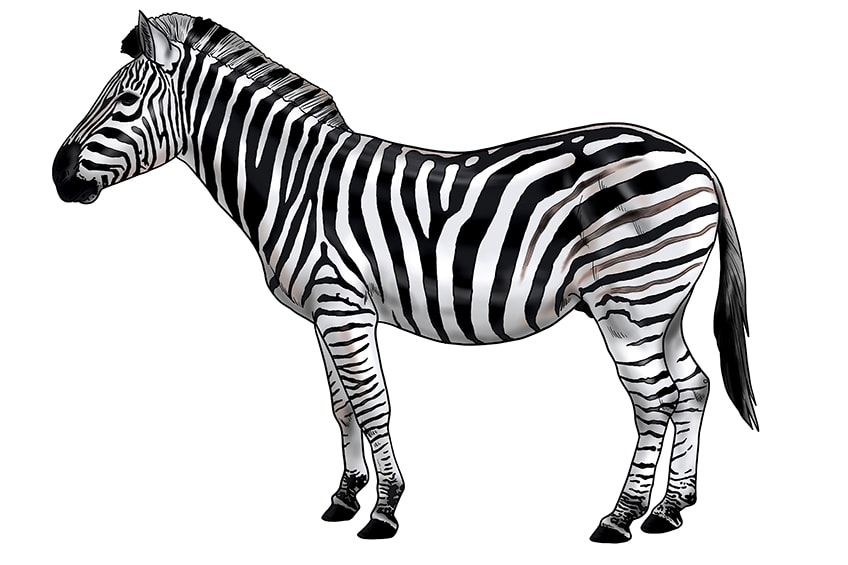
Step 18: Finishing Our Zebra Drawings
To create a seamless finish to your zebra drawing, you can now erase the outlines of your zebra drawing and add a dab of white in the center of the eye. To erase the outlines, you can simply use the corresponding color at each point of the outline to carefully trace over it.
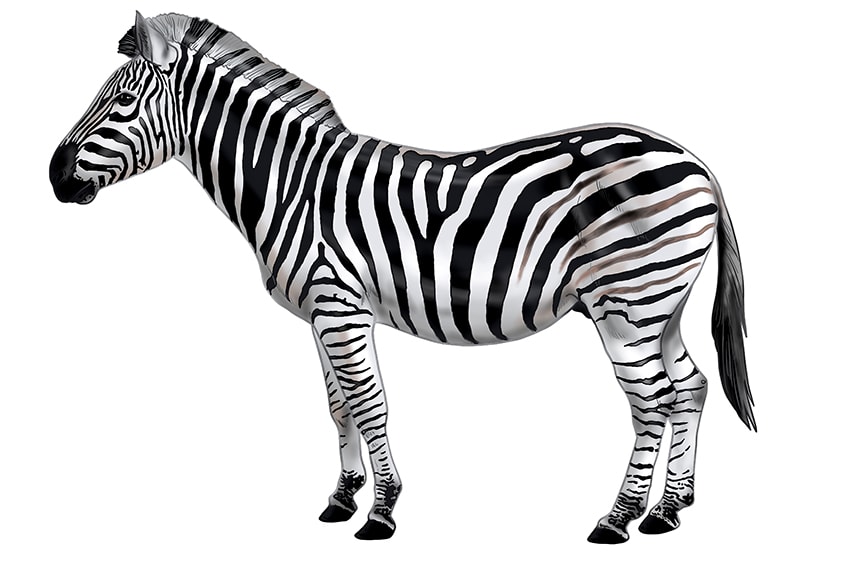
After all this hard work, it is finally time to stand back and admire your very own piece of zebra art. Hopefully you are happy with your work and you feel more empowered to tackle tricky animal drawings like the zebra drawing.
Frequently Asked Questions
If You Have Not Drawn Zebras Before Will This Tutorial Help?
You do not need to have drawn zebras before attempting this tutorial. We take you from the very basics of zebra art so that anyone, regardless of artistic level, can create realistic zebra drawings with ease.
How to Draw a Zebra Step-by-Step?
The best way to create zebra art is to follow a step-by-step tutorial like this one. Using construction shapes to begin with, we can lay the foundations for our zebra drawing. You can then use these shapes to create a detailed outline and realistic colored patterns.
How to Draw a Easy Zebra Step by Step
Source: https://artincontext.org/how-to-draw-a-zebra/
0 Response to "How to Draw a Easy Zebra Step by Step"
Post a Comment